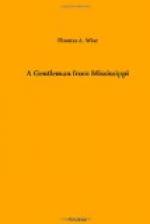The bird is called the “honeybird” because it is a sure guide to the deposits of the delicacy. The bird dislikes the laborious task of pecking its way through the bark to reach the honey, and so, wise in the ways of men, it procures help. It locates a nest of honey, then flies about until it sees some natives or hunters, to whom it shows itself. They know the honeybird and know that it will lead them to the treasure store. Following the bird, which flits just in advance, they reach the cache of dripping sweetness and readily lay it open with hatchets or knives. Taking what they want, there is always enough left clinging to the tree and easily accessible to satisfy the appetite of the clever little bird.
Senator Stevens of Mississippi bears a marked resemblance to the honeybird—so much so that he has well won the bird’s appellation for himself. Abnormally keen at locating possibilities for extracting “honey” from the governmental affairs in Washington, he invariably led Peabody, representing the hunter with the ax, to the repository. He would then rely on the Pennsylvanian’s superior force to break down the barriers. Stevens would flutter about and gather up the leavings.
Equally as mercenary as “the boss of the Senate,” he lacked Peabody’s iron nerve, determination, resourcefulness and daring. He needed many hours of sleep. Peabody could work twenty hours at a stretch. He had to have his meals regularly or else suffer from indigestion. Peabody sometimes did a day’s work on two boiled eggs and a cup of coffee.
The senior Senator from Mississippi had been the first to point out to Peabody the possibilities for profit in the gulf naval base project, but the morning following the conference with Steinert when he rejoined them for breakfast at the Louis Napoleon he was far from comfortable. He did not mind fighting brain against brain, even though unprincipled methods were resorted to, but indications were that more violent agencies would be called into play owing to the complications that had arisen.
Stevens ate heartily to strengthen his courage. Steinert ate hugely to strengthen his body. Peabody ate scarcely anything at all—to strengthen his brain.
Waving away the hotel waiter who had brought the breakfast to his apartment, Senator Peabody outlined the probable campaign of the day.
“If our best efforts to weaken and scare off Langdon fail to-day,” he said, “it will naturally develop that we must render it impossible in some way for him to appear in the Senate at all, or we must delay his arrival until after the report of the committee on naval affairs has been made. In either event he would not have another opportunity to speak on that subject.
“Of course, later, at 12:30, we will know his plan of action. Then we can act to the very point, but we must be prepared for any situation that can arise.”
“Cannot the President of the Senate be persuaded not to recognize Langdon on the floor? Then we could adjourn and shut him off,” asked Stevens.




